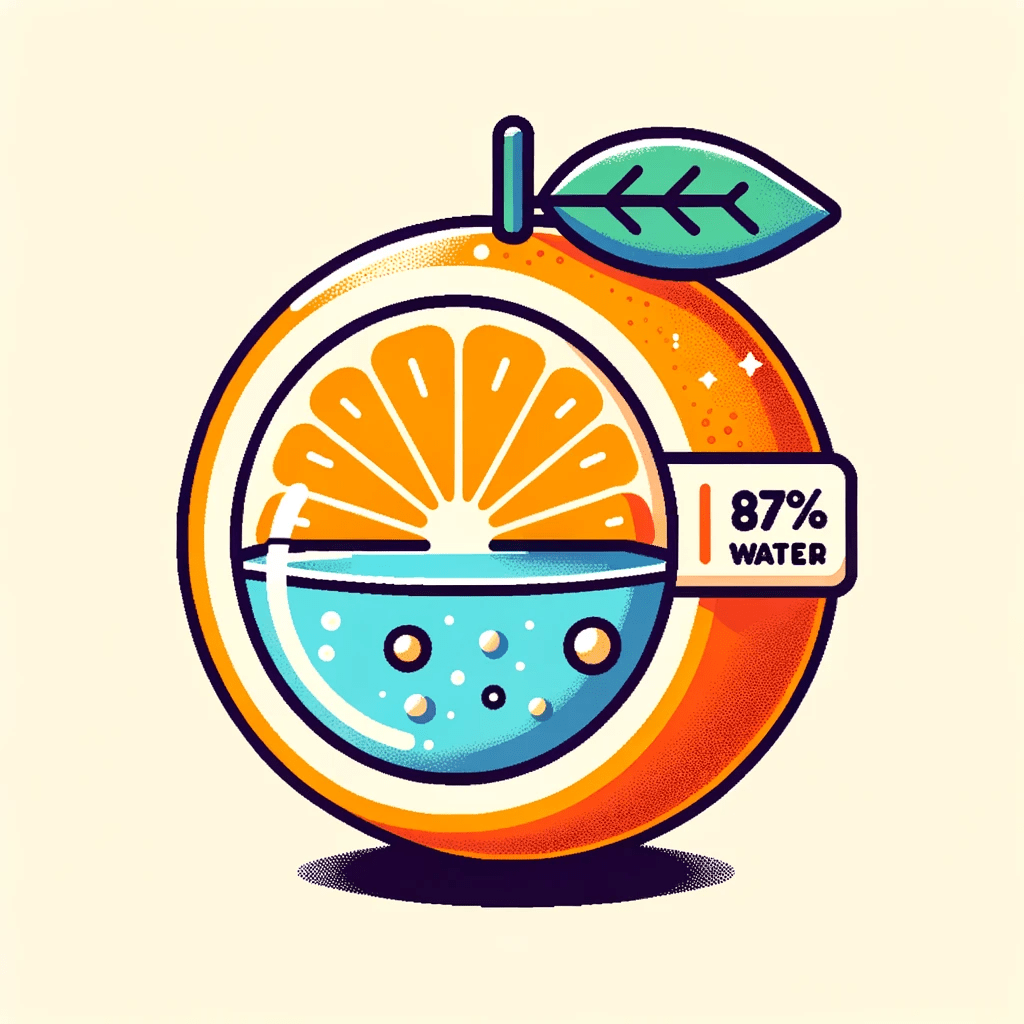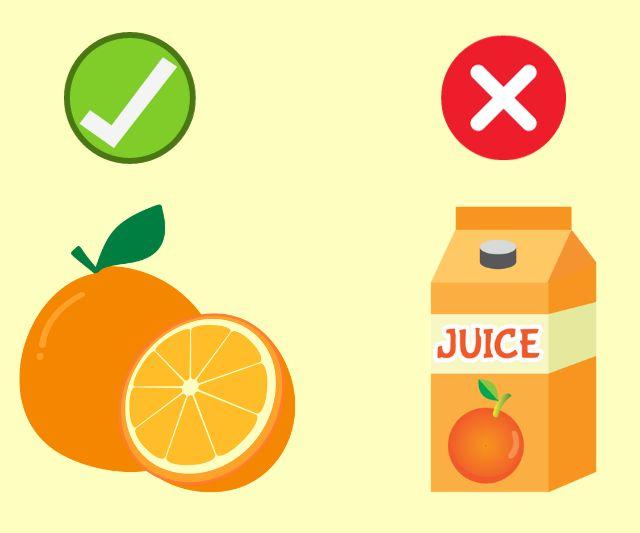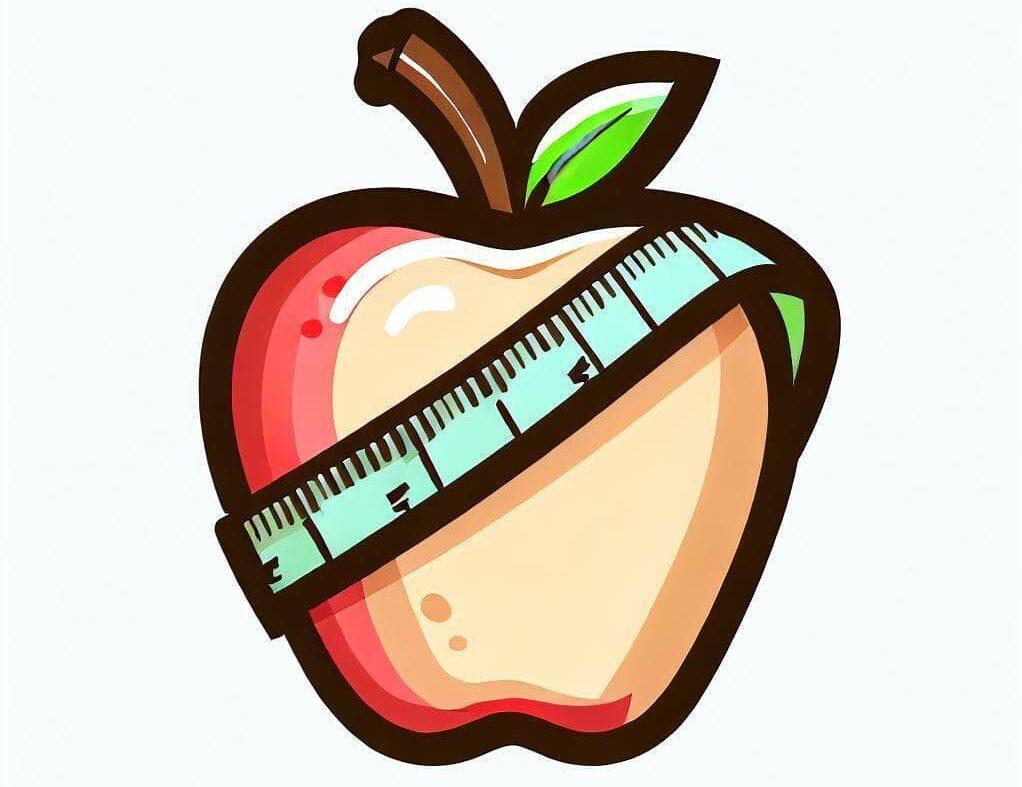Are Oranges Good for Weight Loss?
This post may contain affiliate links which means I may receive a commission for purchases made through links at no extra cost to you. See my disclosure policy for more information.

“Are oranges good for weight loss?” Yes, oranges are good for weight loss because they are high in fiber and water content.
Both these features mean when you eat oranges they can quickly fill you up, unlike fruits that are only rich in sugar.
As someone who works with people on improving their eating habits, the topic of oranges often comes up.
Look, oranges are no better than other citrus fruits, they are good in the sense that if you eat them sparingly at the right time, you can reap their benefits while trying to lose weight.
But they do have some benefits and some drawbacks that you have to keep them in mind. Let’s see which ones.
Nutritional Value of Oranges
As per the USDA, one medium-sized orange contains the following nutrients:
Serving Size: 1 orange (131 g)
Calories: 61
Protein: 1 g
Carbs: 15 g
Sugar: 12 g
Fiber: 3 g
Fat: 0.1 g
Potential Benefits of Oranges for Weight Loss
The potential health benefits of eating oranges for weight loss are the following:
High in Fiber

Oranges are high in fiber content.
So when you eat an orange when you feel like having a snack, the soluble fiber, forms a gel-like consistency in the stomach, slowing the digestion and absorption of sugar, which leads to a prolonged feeling of fullness and reduced hunger.
This delayed gastric emptying can subsequently lead to reduced calorie intake.
The good bacteria in your gut also need fiber for their own purposes.
When these bacteria chew on fiber in the colon, they produce short-chain fatty acids, which have been shown to increase feelings of satiety.
Also, by preventing rapid spikes in blood sugar, fiber helps maintain stable insulin levels, reducing the likelihood of fat storage and promoting the body’s use of stored fat for energy.
They Have High Water Content

Oranges are made up of around 87% water.
When you eat a high-water fruit like orange or watermelon before having your main meal, the water in it occupies space in the stomach, leading to a reduced capacity for food.
This physical sensation of fullness can signal the brain to think that it is not that hungry before you eat your meal, causing you to eat less at lunch or dinner.
Natural Energy Boost

Oranges are rich in simple carbohydrates.
When consumed, these carbohydrates are rapidly absorbed into the bloodstream, increasing blood glucose levels.
Muscles rely on glucose as a primary fuel source during high-intensity activities.
By ensuring an adequate glucose supply, muscles can sustain maximum contractile force and endurance.
High-intensity workouts with sustained energy can elevate the metabolic rate through a phenomenon called excess post-exercise oxygen consumption (EPOC), where the body continues to burn calories at an elevated rate post-exercise.
This process, combined with the immediate calorie burn from the workout, contributes to effective weight loss.
Easy to Add to Diet

Convenience is key to maintaining a healthy lifestyle.
Oranges store well at room temperature and require no prep, making them an easy grab-and-go snack.
Studies show accessible healthy options help improve dietary habits long term.
Downsides of Oranges for Weight Loss
Here are some cons of oranges to keep in mind:
Not Weight Loss Friendly in Juice Form

I know many of you love having a glass of orange juice with your breakfast. I did as well. Until I found out how the body processes it.
On average, it takes about 3 to 4 oranges to make a glass of juice.
This glass of fresh orange juice contains approximately 20-25 grams of sugar, of which about half is fructose.
This means a typical glass of orange juice has around 10-12.5 grams of fructose.
Now the problem is that in your whole body, only the liver can metabolize fructose.
It has to be converted into glucose first so that the cells in your body can use them.
But unless you are an athlete, the body doesnt need so much glucose because it already has a lot of it stored in the liver and muscles in the form of glycogen.
So when you consume oranges or any other fruits in liquid form, sugars are rapidly absorbed into the bloodstream, leading to a spike in blood sugar levels.
The liver metabolizes fructose, and when taken in excess, it gets converted into glucose and then into fat.
The liver gets overwhelmed with fructose and it converts them to glucose and then into fat.
Over time this process leads to fat accumulation around your belly fat, especially in the liver thus resulting in weight gain.
Additionally, fruit juices lack the fiber present in whole fruits, which is needed to make you feel full and slow down the absorption of sugars.
Potential for Overconsumption

Although they offer valuable fiber, their sweet taste can tempt you to eat more than you intended.
Even if oranges don’t have many calories on their own, eating a lot without paying attention to how many can add up to more calories than you might think.
This could hinder your weight loss efforts.
People with strong sugar cravings might find oranges don’t quite hit the spot, pushing them to snack on less healthy options.
So, while oranges are great, you have to watch how many you eat, especially if you’re aiming for weight loss.
Tips to Incorporate Oranges in a Weight Loss Diet
Add them to Smoothies

Blending oranges into smoothies keeps their fiber content intact, which provides a feeling of fullness. Vitamin C supports iron absorption to fuel workouts and metabolism.
For some people, the liquid also makes it easier to consume the whole fruit versus snacking on slices.
Use oranges to replace added sugars or juices normally used in smoothies.
Add it to Salads

Eating salads is often recommended by nutritionists for people looking to reduce their calorie intake.
But I understand that it can be pretty bland and boring to eat them on a regular basis.
This is where adding some sweetness from oranges can make your salad platter a bit more attractive for you to gulp down.
Also Read: Is Caprese Salad Good for Weight Loss?
Make an Orange Infused Water

We often hear from doctors that “you must keep your body hydrated at all times”. But let’s face it, not everyone enjoys the taste of bland water.
Cutting some slices of oranges and adding them to your bottle of water can make your drinking experience more enjoyable so that you don’t dread drinking plain water.
Also Read: Is Bai Good for Weight Loss?
Alternatives to Oranges for Weight Loss
Apples
Apples contain pectin, a type of soluble fiber that can help reduce appetite. Studies show pectin slows digestion which helps you feel full.
It also binds to cholesterol in the gut preventing absorption.
The antioxidants in apples called quercetin & phloridzin may help regulate glucose levels. Preliminary research links phloridzin to increased fat oxidation.
Berries
Berries contain both soluble and insoluble fiber which moves through the gut slowly, promoting fullness.
Both types of fiber are linked to reduced calorie intake and weight loss.
Berries have antioxidants that may help regulate fat storage signals within cells & break down fat for energy.
Their anthocyanins may reduce inflammation linked to obesity.
Also Read: Are Strawberries Good for Weight Loss?
Grapefruit
Grapefruit contains naringenin, a flavonoid that’s been linked to weight & fat loss in mouse trials.
It may block an enzyme that regulates fat cell production and growth.
Grapefruit essential oils are also believed to stimulate fat burning based on rat studies as well as reduce spikes in glucose & insulin which influence hunger levels.
Also Read: Is Mango Good for Weight Loss?
Pomegranate
Studies link pomegranate juice to reduced body fat % & lowered oxidative stress which suppresses appetite.
One rat study found pomegranate extract assisted in breaking down fat cells.
Pomegranate seeds contain fiber, punicalagin & other polyphenols shown to inhibit fat cell development & adipogenesis according to test tube research.
Kiwi
Kiwifruit contains actinidain, a protease enzyme able to break down proteins in the body more efficiently aiding metabolism.
Just two kiwifruits provide over 150% of the vitamin C daily need, a powerful antioxidant shown in animal studies to promote faster calorie & fat burning at a cellular level.
Papaya
Papaya is rich in papain, a digestive enzyme that aids protein digestion helping escort nutrients to cells faster which can boost metabolic rate slightly.
Carotenoids like beta-carotene in papaya convert to vitamin A supporting weight regulation in the body.
Its seeds also contain a compound called benzyl isothiocyanate that has been shown to reduce fat accumulation in lab studies.
Also Read: Is Watermelon Good for Weight Loss?
Conclusion
Orange is a watery citrus fruit with a good amount of fiber. And they can be part of a healthy diet for weight loss.
But since they are naturally sweet, you have to moderate your consumption to 1 – 2 a day to avoid packing in more calories and draining your weight loss efforts.
Also when you juice it, it loses its fiber and what remains is the sugar. You might want to avoid juicing it and prefer to eat it instead.
FAQ
Do oranges burn belly fat?
No. Oranges do not specifically target or “burn” belly fat. Weight loss is a result of a caloric deficit, and no single food has the magic ability to target specific fat areas.
Can I eat oranges when losing weight?
Yes, you can eat oranges when losing weight. Just make sure to keep your consumption of oranges to 1 – 2 per day.
Which fruit is best for weight loss?
Fruits like berries, apples, and grapefruit are often recommended due to their low calorie-to-volume ratio and high fiber content.
What fruit burns the most fat?
No single fruit directly burns fat. Some fruits can support weight loss by providing satiety, nutrients, or low-calorie alternatives to other snacks. It’s the overall diet and caloric expenditure that determine fat loss.
This post may contain affiliate links which means I may receive a commission for purchases made through links at no extra cost to you. See my disclosure policy for more information.
Rahul is a professional nutritionist certified by the International Sports Sciences Association (ISSA) and a personal trainer certified through the American Council of Exercise (ACE). He has a special interest in the science of nutrition and how it can impact the body.
